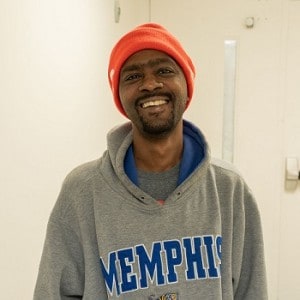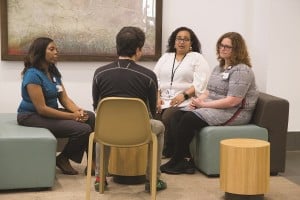Marcus Haley suffered a traumatic brain injury on his birthday. It completely changed his life, making it so that he couldn’t work and faced significant medical needs.
Marcus didn’t know where to turn until Regional One Health’s ONE Health team intervened, helping him meet both his health care and social needs.
Now, Marcus is able to focus on his continued recovery, and he’s approaching his future with hope and gratitude.
For many people, a birthday is a time to celebrate and reflect on where we’ve been and where we want to go in life.
But on Marcus Haley’s birthday, he was robbed of those opportunities and instead thrust into a jarring reality in which he can’t remember the incident that utterly changed his life.
“I had a traumatic brain injury. It happened on my birthday – I either fell or something hit me, and I was knocked out,” Marcus said. “I have no memory of it, but it has completely changed my whole life.”
But Marcus is finding his way thanks to Regional One Health’s ONE Health initiative, which helps patients with complex medical and social needs lead healthier, more productive lives.
Prior to his injury, Marcus, 36, was working at Home Depot. In his spare time, the Memphis native enjoyed hanging out with family and friends.

Marcus Haley says ONE Health has been a blessing in his life. “I really, truly thank them,” he says. “Hopefully this will lead me to a better life, a better understanding and a better experience.”
Now, he can’t work due to lingering effects of his injury – which kept him in the hospital for months – and he’s struggled to pay bills, get reliable transportation and find a safe place to live. He also worries about how his health issues will impact his interactions with other people.
“It throws you off,” he said of his injury. “You’re scared to be around people. You don’t want to have conversations.”
It’s the kind of situation ONE Health was designed for.
ONE Health relies on partnerships and generous grants and donations to the Regional One Health Foundation to help patients pay for medications and attend regular doctor appointments for ongoing care while also accessing housing, food, job training and more.
In Marcus’ case, it was crucial he continue to receive expert medical care after he was released from the hospital.
Traumatic brain injuries are extremely complex, and even after patients are past the life-threatening stage of their condition, they require extensive long-term care including medication, therapy and more to continue rebuilding as normal a life as possible.
For a patient like Marcus, who did not have health insurance, that road was even more daunting.
ONE Health stepped in to pay for his medications, and Renesa Clemons, his ONE Health social worker, schedules his doctor appointments and makes sure he has a reminder – and a ride – so he can get to them. Renesa also worked with partner agencies to help Marcus find housing so he has a safe environment to continue his recovery.

ONE Health works with patients who have complex health and social needs. The team helps with everything from accessing needed medical care to finding housing, food and employment.
For Renesa and her colleagues, the process of talking to a patient, listening to their priorities, and working to address their needs is based on a successful model honed over the past two years.
For Marcus, it’s something much more simple: “A blessing.”
“I’m thankful,” he said. “People don’t have to take the time to help you, but it’s a great blessing when they do. I feel like I’m on a team.”
Marcus says without ONE Health, he’d be struggling to survive and meet his day-to-day needs. Instead, he feels like he’s in a place where he can continue to heal and find his new normal.
“My life could be a lot different – a lot more difficult, and a lot more stressful. Now, it’s more peaceful. I’m able to rest, take my medication, take walks and exercise.”
Marcus may have been robbed of the chance to reflect on life and imagine his future on his last birthday, but now those are things he does every day.
And when he does, it’s with a lot of gratitude. “I really, truly thank them. I have a smile every day,” he said. “I really want to get back to doing the things I’m used to. Hopefully this will lead me to a better life, a better understanding and a better experience.”

